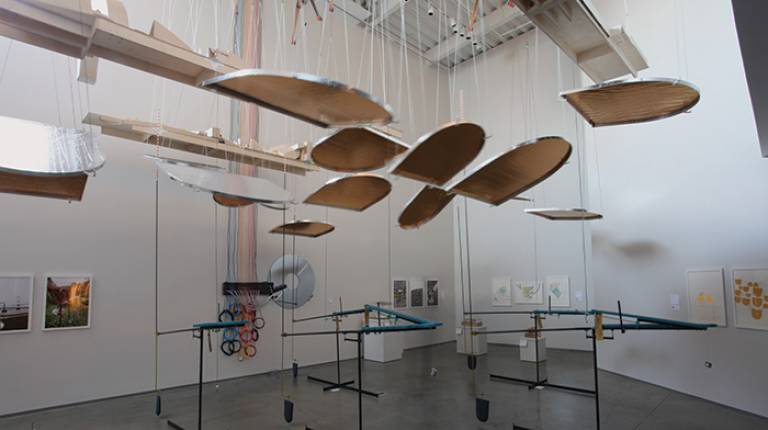
Overview
Hydrological Infrastructures is an exploration of the global hydrological cycle and local hydrological variability prompted by climate change and anthropogenic progress. It focuses on the design of a technological landscape in the form of an installation and architectural design. It aims to visualize the sequences and relationships of environmental processes and fuse architecture and infrastructure with landscape in a responsive and sustainable fashion. Two scales of research were undertaken:
Surface Tension is a large interactive installation that considers peak water. It simulates the undulations, waves, droughts and surges of the planet's hydrological cycle. The design is envisaged as a technological landscape that animates and annotates these complex environmental systems and our connectivity with them. It is comprised of an eight-metre-high, vertically organized kinetic network of analogue and computational devices that animate suspended balancing structures occupying the double height space of the Nevada Museum of Art's Contemporary Gallery.
Incorporated into the installation is Wet Lands: Architectural Waterscapes and Soft Infrastructures for the Thames Gateway, which addresses water stress. These models and drawings propose a soft hydrological infrastructure fused with housing. Sited in the Thames Gateway Regeneration Zone, the project repurposes an extended metropolitan area which runs along the north bank of the Thames through the marshes at Rainham and beyond to Tilbury. The scheme was developed through a speculative drawing and modelling technique and scaled up to be suspended amongst the installation mechanism for the Gallery show.
Hydrological Infrastructures was commissioned by Nevada Museum of Art's Center for Art and Environment for the exhibition Landscape Futures: Instruments, Devices, and Archives (2011–2012).
People
Laura Allen
View Laura's profile
Send Laura an email
Mark Smout
View Mark's profile
Send Mark an email
 Close
Close

